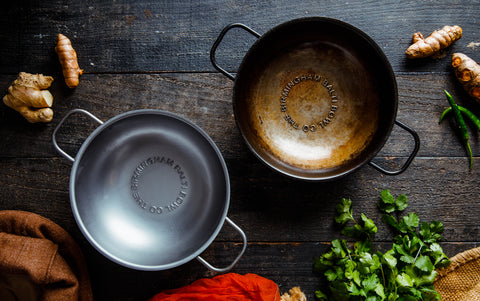Care for your Balti Bowl

For best results we recommend using your balti pan over a natural gas flame, in addition to following the advice on 'seasoning' and care given below. By doing so your bowl will eventually develop the black mottled patina effect beloved by balti enthusiasts nationwide and beyond. Whilst your balti pan will arrive slightly oiled, it is recommend you season your balti pan upon receipt to provide an initial protective patina layer to the uncoated carbon steel.
Your authentic balti bowl has been manufactured from carbon steel (as with all authentic baltis) in Birmingham, UK. This is an uncoated metal, that is non toxic, (compared to many teflon or stainless steel pans) Our carbon steel balti bowls have been tested and are proven to have health benefits and added flavour complexity in cooking. It is the number 1 choice of professional chefs worldwide.
If you've never cooked using an uncoated pan before it can be quite a change. There is more care involved but the pans lifetime is much longer (often life long) and the pans only improve with use and age. Bonus!
Firstly, your bowl may arrive with some small marks from manufacturing or even some minor rust spots. This is normal and nothing to worry about. Carbon steel, like cast iron is a 'living metal' and highly sensitive to atmospheric conditions. If your pan has some minor rust speckles please be aware that it is a completely natural reaction and can be rectified with white vinegar (the kind for consuming and not cleaning as the latter has added chemicals!) and a light scouring sponge (the washing up variety with yellow base and green top are ideal) Gently clean/scrub away any oxidisation marks, dry the pan and get ready for seasoning.
Carbon steel can be treated in the same way as cast iron kitchenware and woks. Seasoning your authentic Balti bowl prior to use will start the process of creating a smooth, non-stick surface that actually improves with age. The patina develops over time to retain a build up of spice flavours, with research even suggesting this can contribute to the final flavour of the food.
You can season your bowl using either a stove top method or in the oven.
OVEN METHOD;
On receiving your bowl..
1. Pre-heat oven to 180°C
2. Gently wash in hot not too soapy water.
3. Rinse thoroughly.
4. Towel dry, then place in oven to dry for 2-3 minutes.
5. Remove from oven. Then turn up the heat to 220°C
6. Using kitchen towel, lightly apply a mild vegetable oil, sunflower oil, flaxseed oil or grapeseed oil to entire surface (including the base and handle). Be careful not to use too much oil or coating will be too thick. We do not recommend nut oils for seasoning your pan or olive oil as the smoke point is too low.
7. Return to oven placing bowl upside down on the oven shelf.
8. After 20 minutes, turn off the heat without removing bowl from the oven and let sit for 10 minutes.
9. Remove and leave to cool for a further 10 minutes
10. Repeat steps 6-10 a further x 2/4 times for a beautifully seasoned Balti pan.
* Wash with warm water after each use (minimal soap) using a soft washing sponge only if necessary to remove any stuck-on bits. Towel dry, then place in an oven set at 180° for a couple of minutes to ensure bowl is completely dry. Lightly oil and place a piece of kitchen towel in the middle (especially if storing more than one bowl and stacking) before storing away. If you do not dry your bowl directly and thoroughly after washing it may rust. Never wash your bowl in your dishwasher, it will rip away the seasoning and may oxidise due to the chemicals and harness of the water jet.
* If rust does occasionally appear on the surface of your bowl, wipe with white consumable vinegar soaked dish sponge (the yellow/green ones), wipe away the vinegar, wipe dry before coating with oil to halt any further oxidation and ideally give your bowl a further season.
* Avoid leaving your bowl to soak in dishwater - The perfumed oils from washing up liquid can soak into your seasoned layer and make your food taste all soapy.
Store your bowl in a dry cupboard.
These bowls have been machined and some abrasions may be noticeable but are a natural result of an industrial process.
Check out The Curry Kid unboxing and seasoning his Birmingham Balti Bowl

An authentic Balti Bowl after seasoning and a few cooks.
